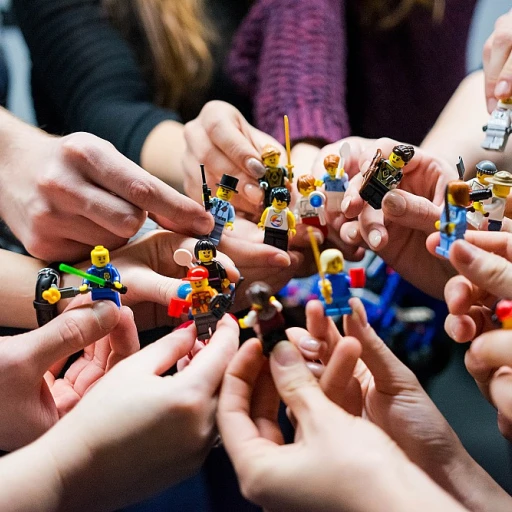Understanding the Mentee's Goals
Nurturing a Clear Vision: The First Step
Delving into the world of mentoring means embarking on a journey to understand your mentee's goals, an essential aspect of any successful mentor-mentee dynamic. At the start of the mentoring relationship, mentors will benefit from crafting open-ended questions that allow mentees to express their ambitions and aspirations freely. Such questions help uncover the mentee's thought processes and priorities, providing crucial insights for both parties.
Developing a clear understanding of personal and career goals can be pivotal. Encouraging mentees to articulate their short-term and long-term ambitions establishes a direction for the mentorship program. This discussion will help mentees focus on their paths while aiding mentors in tailoring their advice and support to specific objectives.
- What truly drives you to succeed?
Asking this question allows a mentor to tap into the mentee's intrinsic motivations, setting the stage for a more personalized mentoring experience.
- Where do you see yourself in five years?
This classic question aids in visualizing future career aspirations, offering a framework for the mentoring session's trajectory.
By dedicating time to these initial conversations, mentors and mentees can craft a shared vision that will lead to effective mentoring partnerships. As you continue exploring effective mentor-mentee relationships, consider strategies that address challenges and obstacles, explore career aspirations, and promote growth. For more insights into navigating these dynamics, check our
guidance on mentor mind games.
Assessing Strengths and Areas for Improvement
Evaluating Strengths and Recognizing Growth Opportunities
Mentoring involves understanding where a mentee excels and identifying areas ripe for development. This understanding can be crucial for crafting personalized feedback and setting clear goals in the mentoring program. By effectively assessing these aspects, mentors can better help mentees cultivate essential skills for their career growth.
- Ask open ended questions. Delve into the mentee's experiences by asking open-ended questions such as "What projects have you enjoyed the most and why?" This approach not only sheds light on what they are good at but also aligns their career aspirations with tasks they find fulfilling.
- Reflect on past performance. Consider your mentee's previous roles and responsibilities. What successes have they achieved? What feedback have they received? This will help determine key strengths and areas for improvement.
- Assess current skills. Discuss with your mentee the skills they believe they excel at. An honest evaluation can reveal strengths they may be unaware of and highlight weaknesses that, once addressed, can bolster their career trajectory.
- Focus on continuous improvement. Encourage the mentee to view their career as a journey. This mindset fosters a relationship centered on growth, where both mentor and mentee are engaged in working towards long-term goals.
Building a successful mentoring relationship means filling in the gaps where challenges appear and creating strategies to overcome these obstacles. Unlocking Success with High Potential Mentoring Programs can be an effective way to enhance your skills as a mentor, making sure you provide the best support for your mentee as they navigate their career path
here. Whether it's through structured feedback, coaching methodologies, or simply being a listening ear, the aim is to propel your mentees toward their ultimate aspirations.
Exploring Career Aspirations
Discovering Professional Aspirations for Future Growth
When engaging with your mentee, exploring their career aspirations is a fundamental step in guiding the mentoring relationship toward meaningful outcomes. Understanding a mentee’s aspirations not only provides a valuable context for their goals but also aligns their personal ambitions with the bigger picture of their professional journey.
In the process of identifying their career aspirations, several strategies can be beneficial:
- Utilize open-ended questions: These questions encourage mentees to reflect deeply and articulate their long-term goals. For instance, questions like "What is the ultimate role you envision for yourself in your career?" or "How do you see your skills evolving over the next few years?" can provide profound insights.
- Consider previous experiences: Discuss past challenges and successes they’ve encountered and how these experiences influence their future aspirations. It offers a narrative that can highlight valuable skills and lessons learned.
- Encourage exploration of interests: Sometimes, mentees might not have a clear vision for their future, and exploring different topics or new areas within their industry can ignite inspiration.
It's vital that mentors play an active role in helping mentees reframe or refine their professional aspirations. Support can be offered by sharing feedback, discussing potential skills development, and providing recommendations for resources that aid in skill enhancement, such as
performance management training. Such proactive support roots the mentoring partnership in growth and forward-thinking strategies.
Ultimately, aligning discussions about career aspirations with actionable steps ensures that mentors and mentees can collaboratively work toward achieving specific goals, thus fostering a mutually beneficial and productive mentoring relationship.
Identifying Challenges and Obstacles
Facing and Overcoming Obstacles
An essential part of any mentoring relationship involves navigating the challenges and obstacles a mentee encounters. These hurdles can come in many forms, from workplace dynamics to personal struggles. As a mentor, your role is to help mentees identify these barriers and strategize ways to overcome them.
To truly help your mentee, engage them with open-ended questions that will help them reflect on their experiences. Questions such as, "What specific challenges have you encountered in your current role?" or "How do you feel these obstacles impact your career objectives?" can lead to insightful discussions and solutions.
These mentoring questions not only foster a deeper understanding of the mentee's environment but also build a stronger mentor-mentee relationship. By discussing the specifics of each obstacle, you can work together to develop strategies that empower your mentee to tackle difficulties head-on.
It's important to maintain a supportive approach when addressing these challenges. Providing constructive feedback and encouragement will help mentees gain confidence in their ability to navigate future difficulties. Over time, mentees can develop the resilience and skills needed to handle diverse challenges in their career journey.
Fostering Continuous Learning and Growth
Encouraging a Growth Mindset for Long-Term Success
In any mentoring relationship, fostering continuous learning and growth is key to achieving both short- and long-term goals. This involves guiding your mentee in developing a growth mindset, which is essential for adapting to challenges and changes in their career path.
To effectively foster this mindset, consider the following tactics:
- Ask Open-Ended Questions: Encourage your mentee to explore different possibilities by asking open-ended questions. This approach will help them think critically and communicate their thoughts effectively. For example, you can ask, "What skills do you think will be crucial for your future goals?" or "How do you plan to overcome challenges in your current role?"
- Provide Constructive Feedback: It's important to offer feedback in a way that highlights areas for improvement while celebrating existing strengths. By doing so, you help your mentee identify important areas of growth and understand how these improvements can aid in reaching their career aspirations.
- Develop Skills: Discuss the skills your mentee aims to develop and provide resources or recommendations on how they may acquire these competencies. This could involve suggesting workshops, online courses, or attending industry conferences.
- Encourage Lifelong Learning: Promote the idea that learning doesn’t end with a specific achievement. Lifelong learning is crucial for staying relevant in an ever-changing work environment. Encourage your mentee to seek out new learning experiences regularly.
- Set Incremental Goals: Help your mentee break down their long-term goals into smaller, manageable steps. This approach not only makes the term goals seem more attainable but also provides regular opportunities for satisfaction as they achieve each milestone.
By engaging your mentee with the right questions and guiding them through feedback and resource sharing, you nurture a strong mentor-mentee partnership. This approach reflects an understanding that continuous growth is a shared journey, ensuring both the mentor’s and mentee’s endeavors contribute to the mentor mentee relationship's success.
Building a Supportive Relationship
Building Trust and Encouragement
A strong mentoring relationship fundamentally relies on trust and open communication. To foster a supportive environment, begin by creating a safe space where the mentee feels comfortable asking questions and sharing concerns. This is essential for an effective mentoring program.
Encourage open-ended questions during each mentoring session, as this will help mentees explore their ideas and emotions more freely. For instance, instead of asking, "Did you achieve your goals?" consider phrasing it as, "What challenges have you encountered on your journey toward your goals?" This not only provides insight into their progress but also demonstrates your genuine interest in their experiences.
Create regular opportunities to give and receive feedback. Honest feedback, both constructive and positive, plays a crucial role in helping the mentee grow and improve their skills. Adjust your approach based on the needs and responses of your mentee. This adaptability will ensure that your mentorship is mutually beneficial, leading to long-term success.
Moreover, acknowledging and celebrating the mentee's achievements, no matter how small, can significantly boost their morale and confidence. This encouragement will fill any gaps in their self-doubt and motivate them to work towards their term goals.
Remember, the objective of this mentorship relationship is to provide unwavering support and guidance to help the mentee navigate their path, overcome challenges, and ultimately gain new insights into their career aspirations. Mentors, by offering this kind of support, not only help the immediate goals of the mentee but also lay groundwork for a future of continuous learning and development.














